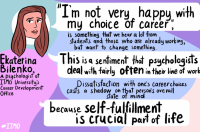In Russia, counseling is quite unpopular; some even consider it useless. Why is this so?
Russian citizens rarely turn to counselling, and tend to rely on advice from their friends and relatives. Still, in recent years, the situation has started to change. The trend for asking for career guidance played a major role in that.
Another factor that can prevent people from getting career guidance is prior negative experience. Many people who already got career guidance counselling (in school, for instance) and didn’t benefit from it wouldn’t want to do it again.. According to Tatyana Klimova, the schoolchildren who’ve already had such a negative experience expect the following issues:
a) career guidance experts will communicate with them in a strict and formal manner;
b) career guidance is only a test, and they give you the results without explaining anything;
c) career guidance at a university is something very serious, so you have to think everything over a hundred times before asking any question;

What’s the point of getting career guidance?
You can turn to a career guidance specialist if you don’t know which career to choose, or make certain that the choice you made is the right one. However, getting career guidance online is not enough: there will always be issues that are best discussed in person.
“Getting an outside perspective is very useful. It’s one thing to listen to your parents’ opinions, but an expert evaluation given in accordance with well-tried methods is something completely different,” comments Tatyana Klimova.
Before getting counselling from an ITMO University specialist, you first have to register on ITMO.START. Your personal page on the portal will provide you with all the necessary information about the university’s activities that have to do with career guidance, and let you apply for a career guidance session which will help you choose a School and learn more about your aptitudes and interests.

After applying for a career guidance session, you will first have to take a test.
“A career guidance session is similar to a job interview, or the process of writing a CV, explains Tatyana Klimova. The test takes about an hour and a half, after which the applicant sends it to me, and we make an appointment. Such steps are necessary in order to exclude unmotivated participants. Many think that just coming to a session is enough. But things don’t work this way: you have to put in a lot of effort in this process in order to get a result.”
During career guidance sessions, the school student gets acquainted with the psychologist, and gets their test results commented upon. Such sessions are individual and take up to an hour. After that, the student can share the results with their parents. The students get told of different professions, skills, and the basics of goal setting, as well as the many opportunities offered by ITMO University. Finally, they get an individual letter with information about their capabilities and references to resources they should study on their own.

When is the time to start getting career guidance?
From the age of 14. It is from this time that this issue becomes relevant, as school students start to think about their future careers and plan their lives, explains the expert.
What’s more, different students are welcome to get career guidance at ITMO University: those who want to focus on technical sciences only, and those who are more interested in non-technical or interdisciplinary fields. ITMO University has many Schools, so people with different competencies can study there.
Five typical problems, and ways for solving them
School students come to career guidance experts with questions like how to choose a program track if they don’t have the slightest idea of the many opportunities they have, what exactly do they need to do in order to develop their abilities, and so on. Let’s take a look at the most common issues, and how career guidance helps with them.

Problem 1: “My parents want me to choose a particular career, but what I want is completely different”
One of the essential conditions of a career guidance session is that the student and the expert are the only people who take part in it. Only after the session ends, the results can be discussed with the student’s parents; what’s more, it is the students who get the right to speak up first, so that they can explain to their parents what they’ve learned from talking to a specialist.
So, what is the proper way to deal with a situation when the student’s and their parents’ opinions on their future career differ?
“I first listen to the youngsters, and try to understand what they are interested in. It often happens that what they want is different from their parents’ wishes. For instance, the student wants to become an entrepreneur, and their parents insist on taking up science. There’s always a way out of such a situation. One option is to suggest a development path that is based on both opinions. The student can join a Bachelor’s program per their parents’ advice, and then focus on developing entrepreneurial skills during their Master’s years. The other is to talk to their parents and explain what they really want. In some cases, it is me who talks to them, as it’s one thing when they listen to the opinion of a student whom they consider a child, and it’s another when they listen to an opinion of an expert who can persuade them to listen to their child’s viewpoint,” comments Tatyana Klimova.
Problem 2: “I know for sure that I’ll be a programmer: it’s not a hard job, it’s very popular, and IT specialists have the best wages”
Being concerned with modern trends and money only is not the best way to go. It’s important to understand the specifics of one’s desired work, and also check whether you possess the minimal level of knowledge and skills for developing in a particular field, or are at least ready to learn them.

“I sometimes work with students who want to become programmers only because there’s much money in IT, that is popular, because programmers have flexible hours and so on. When I hear such things, I always ask the question: “which programming languages do you know?”. Oftentimes, they answer that they know none. One’s wishes don’t always measure up against one’s abilities. Still, if you really want to achieve something, let’s think about the ways to attain it!” notes the psychologist.
Problem 3: “I can’t choose a particular field: they are all very interesting”
This may well be the most common reason to seek career guidance, which is why a psychologist’s most relevant task is to not motivate students to study harder, but help those who already focus on too many different fields.
“Some students study a lot, manage to do everything on time, but they still fail to listen to themselves and understand what they really want. In this case, it is communication that helps. By all means, there are many students who can become successful in many areas, but I never narrow down their opportunities. Specialists in career guidance always suggest several options and leave the choice to the student. Career guidance is not when they tell you your future profession and you go learn to do it - it is rather a means to choosing several promising paths from the billions of possible ones,” says the expert.

Problem 4: “I want to become a psychologist but I don’t like people”
In every profession, it is possible to apply various abilities. This is why we always discuss the participants’ individual traits when giving consultations: whether they like working as part of a team or not, how good they are at multitasking and so on.
“I sometimes meet students who say that they are interested in psychology, but they don’t want to communicate with people. What should they do? This means that they won’t be good at psychology of communications or consulting, but can still do research and work with databases and statistics. For some, it comes as a surprise that it is possible to apply different and sometimes even opposite aptitudes in the same field. This is true for the field of programming, as well: some focus exclusively on writing the code, and others are great at managing teams or working as digital evangelists,” explains Tatyana Klimova.
Problem 5: “What if I make the wrong choice, and will be kicking myself for the rest of my life?”
Career guidance helps relieve anxiety. Not everyone can make their choice of a lifetime when they are still in 8th grade, and that’s totally normal. During a career guidance session, it is better to focus on your aptitudes and interests, and make plans for the foreseeable future.
If you are not sure about your choice, it is recommended that you take career guidance sessions every year. This way, you will have the opportunity to monitor the changes in your preferences, and look at the possible options from a variety of angles.




